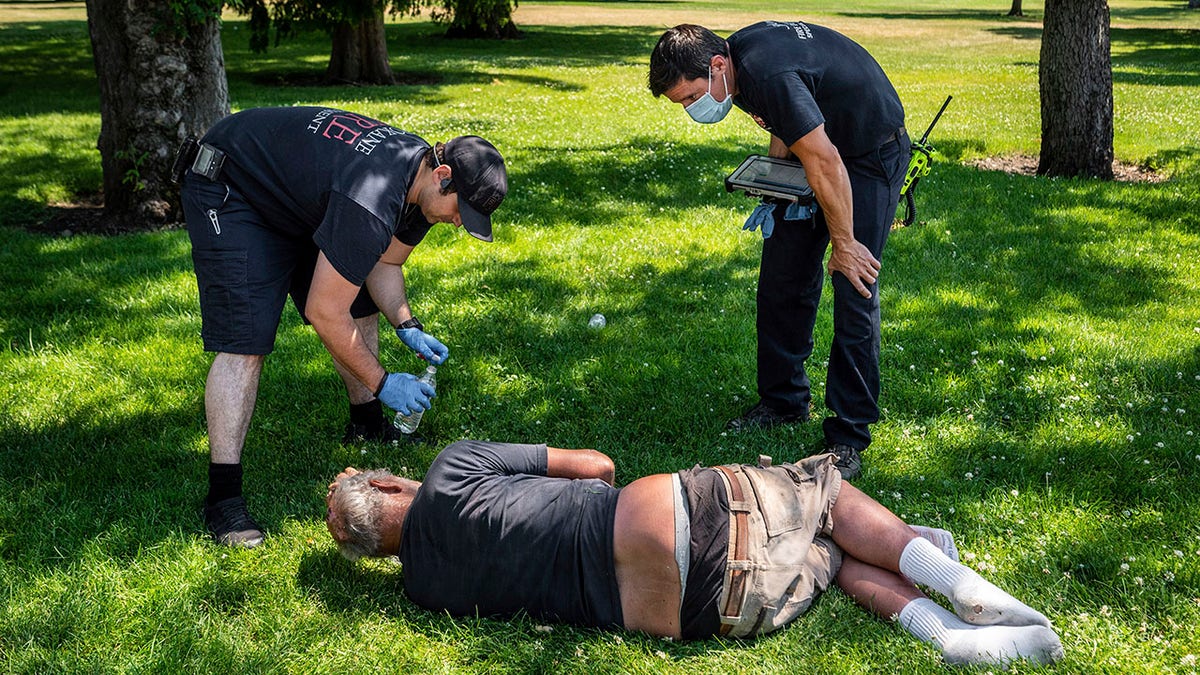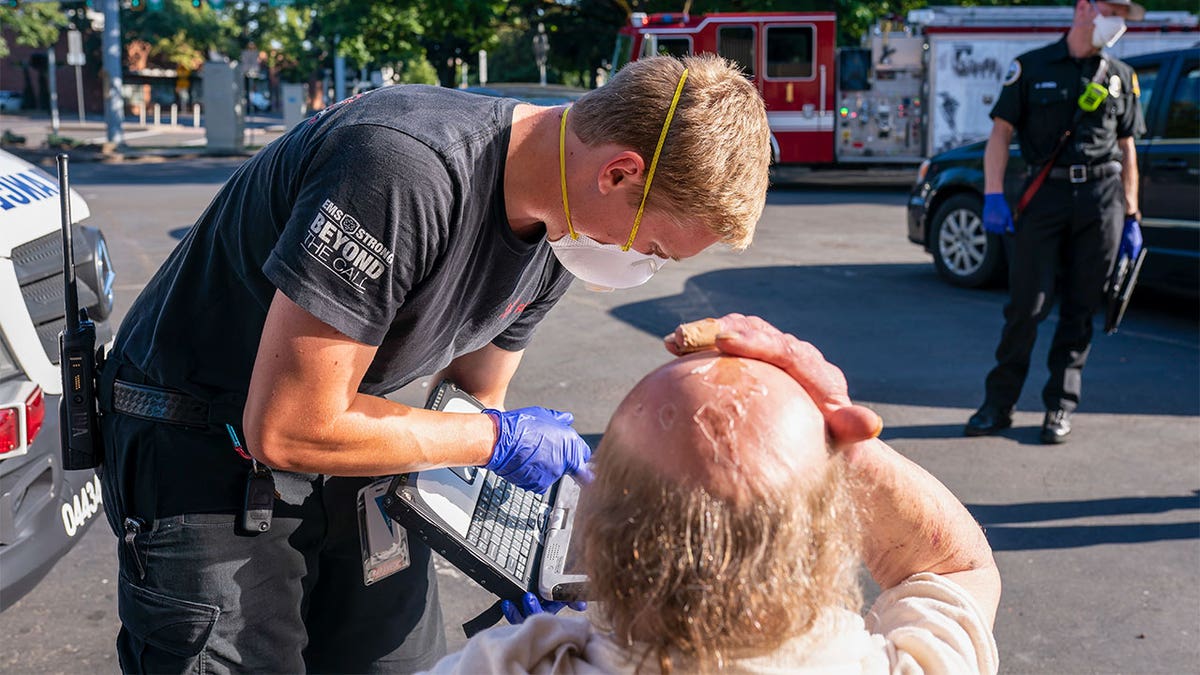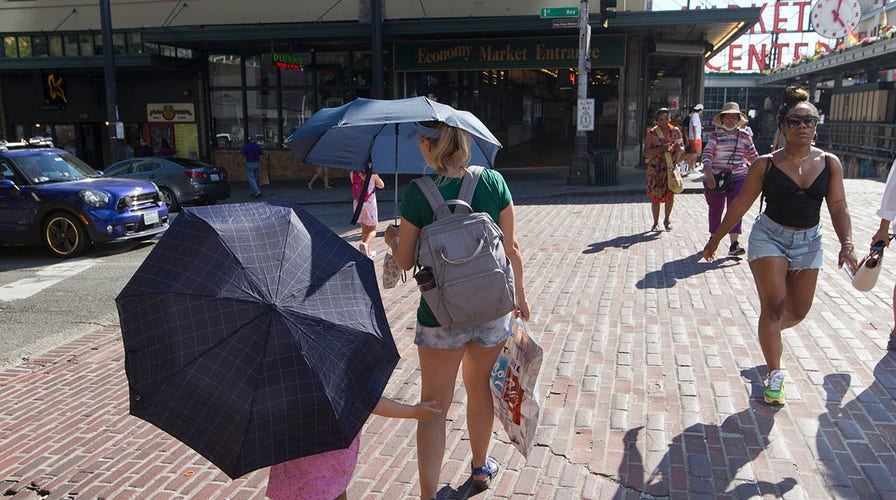Fox News Flash top headlines for June 30
Fox News Flash top headlines are here. Check out what's clicking on Foxnews.com.
The blistering heat wave battering the Pacific Northwest this week has already killed around a dozen people in the U.S. and sent more than 1,000 people to local medical facilities.
During a Wednesday briefing with cabinet officials, governors and private sector partners to discuss the heat, drought and wildfires in the Western U.S., President Biden told attendees 2021 could be "even tougher based on the weather patterns" than the previous summer.
"I know you all know this better than any other people in the country. The fire season traditionally lasts through October. But, with climate change driving the dangerous confluence of extreme heat and prolonged drought, we're seeing wildfires of greater intensity that move with more speed, last well beyond traditional months of fire season," he said. "And, that's a problem for all of us. Wildfires are not a partisan phenomenon."
The president said the West's extreme heat is not only a risk amplifier for wildfires, but a "threat in and of itself."
"People are hurting. It's more dangerous for kids to play outside. Roads are buckling under the heat. I need not tell all of you. We need people to check on their neighbors, especially seniors who may need a helping hand. Outdoor laborers like our farmers and construction workers are going to need frequent water breaks and shade," he said.
"I want to thank the governors and local leaders for providing information to citizens and the resources like cooling centers where people can go to get relief from the heat. And to our utility leaders, we are ready to work with you to make sure that people have access to power including air conditioning under these extreme demand conditions while continuing to advance our climate goals," Biden said.
The Oregon Health Authority said in a Tuesday release that beginning on June 25, Portland Metro area hospitals recorded 506 heat-related emergency and urgent care visits, with 251 visits due to heat on Monday alone.
RECORD TEMPERATURES GRIPPING NORTHWEST LINKED TO AT LEAST 2 DEATHS IN WASHINGTON
Additionally, Oregon Health Authority spokesperson Delia Hernández said that 128 people visited state hospitals for heat-related illnesses on Sunday, when record-breaking temperatures reached their peak.
Comparatively, there were 24 heat-related hospital visits on Friday and 56 on Saturday.
"The extreme temperatures we have experienced over four successive days can lead to serious health complications, and we are now seeing the resulting demand for emergency services provided by our hospitals," Dr. Dana Hargunani, chief medical officer for OHA, said in the news bulletin. "Right now we are asking the public to treat potential heat-related illnesses as serious, but work with healthcare providers in non-emergency settings when appropriate who can address these conditions to ensure capacity remains available for regional ED services."

With the temperature well over 100 degrees, Spokane, Wash., firefighter Sean Condon, left and Lt. Gabe Mills, assigned to the Alternative Response Unit of of Station 1, check on the welfare of a man in Mission Park in Spokane, Wash., Tuesday, June 29, 2021. The special fire unit, which responds to low priority calls, has been kept busy during this week's heatwave. (Colin Mulvany/The Spokesman-Review via AP)
"The sharp increase in heat-related illness visits is quite concerning," Richard Leman, a public health expert with the Oregon Health Authority, said. "Temperatures that get above 100 can be extremely dangerous if we don’t take care of ourselves."
According to KPTV, hospital beds are in "critically short supply" and an Oregon Health & Science University associate professor said the university's hospitals are having to turn away patients in order to focus on more "complex" cases.
In the neighboring Washington state, hospitals recorded 676 emergency department visits for suspected heat-related illness since Friday, according to a BuzzFeed report citing a Washington Department of Health spokesperson. Eighty-one of those visits reportedly led to inpatient admission.
Fox News has reached out to the agency for further verification but did not immediately receive a response.
Before the heat wave reached the area, hospitals were already preparing for a surge of patients, according to the Washington State Hospital Association.
"While the highest temperatures have passed, the impact will be felt by area hospitals for several days to come," a spokesperson for the group told Fox News in a statement. "We encourage people to continue to seek routine care and alert their care providers to any new or worsening symptoms to avoid becoming an emergency patient."
WHAT IS A HEAT DOME? PACIFIC NORTHWEST BOILS UNDER ITS EFFECTS
Seattle's King County Medical Examiner's office said two people died due to hyperthermia – a 65-year-old Seattle woman and a 68-year-old Enumclaw woman – and the Snohomish County Medical Examiner’s Office on Tuesday told the Daily Herald that three men died after experiencing heat stroke in their homes.
Officials in Bremerton, said heat may have contributed to four deaths, but the city's medical officer told the Kitsap Sun that firefighters cannot say definitively whether the heat was the cause of death.
In addition, the heat may have claimed the life of a nursery worker in St. Paul, Oregon, OSHA said on Tuesday.

A paramedic with Falck Northwest ambulances treats a man experiencing heat exposure during a heat wave, Saturday, June 26, 2021, in Salem, Oregon. (AP Photo/Nathan Howard)
In Bend, Oregon, authorities said the deaths of two homeless people may have also been weather-related.
Notably, many homes in the region are not air-conditioned and several people trying to beat the heat drowned or had been reported missing after swimming in Pacific Northwest bodies of water.
CLICK HERE FOR THE FOX NEWS APP
The oppressive heat wave was caused by a dome of high pressure over the region, exacerbated by the effects of climate change.
Data from the National Oceanic and Atmospheric Administration (NOAA) shows that excessive heat is responsible for the most weather-related fatalities in the U.S. during an average year.
According to the agency, extreme heat killed an average of 138 Americans per year from 1990 to 2019.
This story has been updated to include remarks from President Biden
The Associated Press contributed to this report.











































